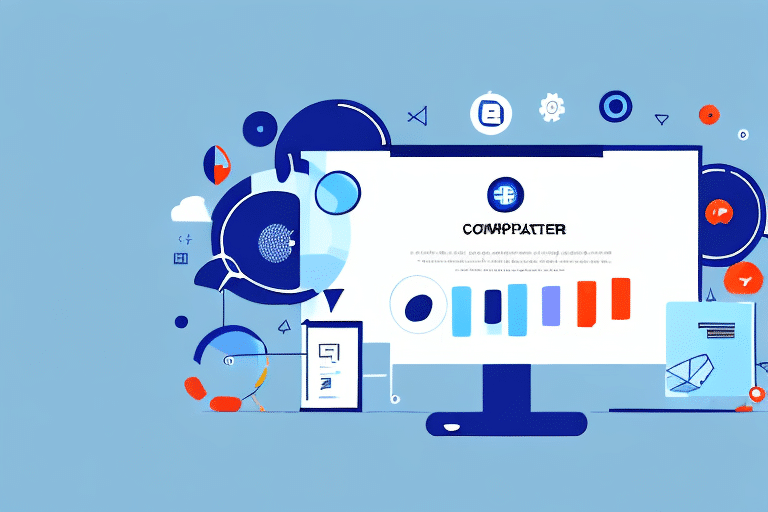What Is Customer Relationship Management (CRM)? A Comprehensive Guide
Customer Relationship Management (CRM) is a strategic approach that organizations use to manage interactions and relationships with current and potential customers. The goal of CRM is to enhance customer satisfaction, loyalty, and profitability by leveraging data analysis and technology to understand customer needs and behaviors. According to Gartner, the global CRM software market is expected to reach $128.97 billion by 2028, growing at a CAGR of 14% from 2023. This growth underscores the critical role CRM systems play in modern business operations.
The Evolution of CRM: From Rolodexes to Artificial Intelligence
The concept of CRM has evolved significantly over the decades. In the early days, businesses relied on manual methods such as rolodexes and spreadsheets to manage customer information. These methods were not only time-consuming but also prone to errors and inefficiencies.
Early Digital Systems
The introduction of personal computers and database management systems in the 1980s marked the beginning of digital CRM. Companies like Siebel Systems, founded in 1993, pioneered the development of dedicated CRM software, allowing businesses to automate and streamline customer interactions.
The Cloud Revolution
The mid-2000s saw a paradigm shift with the advent of cloud-based CRM solutions. Pioneered by companies like Salesforce, cloud CRMs offered unprecedented flexibility, scalability, and accessibility. Businesses no longer needed to invest in costly infrastructure and could access their CRM systems from anywhere with an internet connection.
Integration of AI and Machine Learning
Today, CRM systems are increasingly integrating artificial intelligence (AI) and machine learning (ML) technologies. These advancements enable predictive analytics, automated data entry, personalized customer interactions, and intelligent lead scoring. According to a report by Forbes, AI-powered CRM systems can increase sales productivity by up to 34%.
Benefits of Implementing CRM Software in Your Business
Implementing a CRM system offers numerous advantages that can transform various aspects of your business:
Enhanced Customer Satisfaction and Loyalty
By providing a 360-degree view of customer interactions, CRM systems enable businesses to personalize their communication and service offerings, leading to increased customer satisfaction and loyalty.
Improved Sales and Revenue
CRM systems help in identifying high-value leads, tracking sales pipelines, and automating follow-ups, which can significantly boost sales performance. A study by Business2Community found that CRM applications can increase sales by up to 29% and sales productivity by up to 34%.
Streamlined Business Processes
CRM software automates routine tasks such as data entry, email marketing, and customer follow-ups, allowing employees to focus on more strategic activities. This leads to greater efficiency and reduced operational costs.
Data-Driven Decision Making
With comprehensive reporting and analytics capabilities, CRM systems provide actionable insights that help businesses make informed decisions, optimize marketing strategies, and enhance overall performance.
Types of CRM Systems: Choosing the Right One for Your Business
Selecting the appropriate CRM system depends on your business size, industry, and specific needs. The three primary types of CRM systems are:
Operational CRM
Focused on automating and improving customer-facing processes, including sales, marketing, and customer service. Operational CRM systems streamline workflows, manage customer interactions, and enhance communication across departments.
Analytical CRM
Emphasizes data analysis to gain insights into customer behavior and preferences. Analytical CRM systems use data mining, segmentation, and forecasting to inform strategic decisions and personalized marketing efforts.
Collaborative CRM
Enhances communication and collaboration among various departments within an organization. Collaborative CRM systems ensure that all teams are aligned and have access to up-to-date customer information, facilitating a unified approach to customer management.
Many modern CRM solutions offer a combination of these types to provide a comprehensive approach to customer relationship management.
The Key Features of a CRM System: What You Need
Understanding the essential features of a CRM system is crucial for selecting the right solution for your business:
- Contact Management: Centralizes customer information, including names, contact details, and interaction history.
- Sales Automation: Automates sales processes such as lead management, pipeline tracking, and sales forecasting.
- Marketing Automation: Manages marketing campaigns, email marketing, and social media integration to engage customers effectively.
- Customer Support: Facilitates the management of customer inquiries, support tickets, and service requests to ensure timely resolutions.
- Reporting and Analytics: Provides detailed reports and dashboards to monitor performance metrics and gain actionable insights.
- Mobile Access: Allows access to CRM data and functionalities on mobile devices, enabling on-the-go management.
- Integration Capabilities: Seamlessly integrates with other business tools such as ERP systems, email clients, and e-commerce platforms.
How to Choose the Best CRM Software for Your Business Needs
Selecting the right CRM software involves a strategic approach to ensure it aligns with your business objectives and requirements. Follow these steps to make an informed decision:
- Define Your Objectives: Identify what you aim to achieve with a CRM system, such as increasing sales, improving customer service, or enhancing marketing efforts.
- Assess Your Current Processes: Evaluate your existing workflows to determine how a CRM can address inefficiencies and support your goals.
- Set a Budget: Determine how much you are willing to invest in a CRM solution, considering both upfront and ongoing costs.
- Research CRM Options: Explore various CRM providers, comparing features, scalability, user reviews, and pricing structures. Reputable sources like Gartner's Magic Quadrant can provide valuable insights.
- Request Demos and Trials: Test shortlisted CRM systems through demos or free trials to assess usability, functionality, and compatibility with your business needs.
- Evaluate Customer Support: Ensure the CRM provider offers robust support services, including training, technical assistance, and regular updates.
- Make an Informed Decision: Choose a CRM that not only fits your current requirements but also offers scalability and flexibility to accommodate future growth.
Integrating Your CRM with Other Business Tools: Maximizing Efficiency and Productivity
Effective CRM integration with other business tools can significantly enhance productivity and streamline operations:
Email Marketing Platforms
Integrating CRM with email marketing tools like Mailchimp or HubSpot enables automated email campaigns, personalized messaging, and detailed engagement tracking.
Accounting Software
Linking CRM with accounting solutions such as QuickBooks or Xero facilitates seamless financial management, including invoicing, payment tracking, and financial reporting.
Social Media Platforms
Integrating CRM with social media channels like Facebook or LinkedIn allows businesses to monitor brand mentions, engage with followers, and manage social media campaigns effectively.
E-Commerce Platforms
Connecting CRM with e-commerce platforms such as Shopify or WooCommerce helps in tracking customer purchases, managing inventory, and personalizing shopping experiences based on customer data.
Proper integration ensures that data flows seamlessly across systems, reducing manual data entry and minimizing the risk of errors.
Training Your Team on Using the CRM System: Best Practices and Tips
Successful CRM adoption hinges on effective training and user engagement. Implement the following best practices to ensure your team leverages the CRM system optimally:
- Define Clear Objectives: Communicate the goals and benefits of the CRM system to your team to foster understanding and buy-in.
- Provide Comprehensive Training: Offer hands-on training sessions, webinars, and access to tutorials to familiarize users with the CRM functionalities.
- Create User Guides and Documentation: Develop detailed guides and FAQs to assist users in navigating the CRM system and troubleshooting common issues.
- Encourage Continuous Learning: Promote ongoing education through advanced training sessions and updates on new features and best practices.
- Establish Support Channels: Set up dedicated support channels, such as help desks or user forums, where team members can seek assistance and share insights.
- Monitor Usage and Provide Feedback: Track CRM usage patterns, identify areas where users may need additional support, and provide constructive feedback to enhance proficiency.
By investing in thorough training and fostering a supportive environment, businesses can maximize the effectiveness of their CRM systems and achieve better outcomes.
Measuring Success with CRM: Metrics to Track and Analyze
Evaluating the performance of your CRM system is essential for identifying strengths, uncovering areas for improvement, and ensuring that your CRM strategy aligns with business objectives. Key metrics to track include:
- Customer Acquisition Cost (CAC): The total cost of acquiring a new customer, including marketing and sales expenses. Lower CAC indicates more efficient acquisition strategies.
- Customer Retention Rate (CRR): The percentage of customers who continue to do business with you over a specific period. Higher CRR signifies strong customer loyalty.
- Sales Conversion Rate: The percentage of leads that convert into paying customers. An increasing conversion rate reflects the effectiveness of your sales processes.
- Customer Lifetime Value (CLV): The total revenue a business can expect from a single customer account throughout their relationship. Maximizing CLV is crucial for long-term profitability.
- Lead Response Time: The average time taken to respond to new leads. Faster response times can significantly improve conversion rates.
- Sales Cycle Length: The average duration from the initial contact with a lead to the closing of a sale. Shorter sales cycles enhance sales efficiency.
- Customer Satisfaction Score (CSAT): A measure of customer satisfaction based on surveys and feedback. High CSAT scores indicate positive customer experiences.
Regularly analyzing these metrics enables businesses to make data-driven decisions, optimize their CRM strategies, and drive continuous improvement.
Overcoming Common Challenges with Implementing a CRM System
Implementing a CRM system can present several challenges. Addressing these effectively ensures a smoother transition and higher chances of success:
Employee Resistance
Some employees may resist adopting a new CRM system due to fear of change or perceived complexity. To mitigate this, involve them early in the selection process, clearly communicate the benefits, and provide comprehensive training.
Data Quality Issues
Accurate and consistent data is crucial for a CRM system to function effectively. Establish data entry standards, conduct regular data audits, and utilize data cleansing tools to maintain high data quality.
Lack of User Adoption
For a CRM system to deliver value, it must be actively used by the team. Encourage adoption by demonstrating the system's benefits, simplifying workflows, and providing ongoing support and incentives for usage.
Integration Difficulties
Integrating the CRM system with existing tools and platforms can be complex. Choose CRM solutions with robust integration capabilities and consider using middleware or APIs to facilitate seamless connectivity.
Cost Overruns
Unexpected costs can arise from additional licensing, customization, or training needs. To prevent budget overruns, clearly define requirements, select scalable CRM solutions, and plan for potential expenses in advance.
Proactively addressing these challenges through effective planning, communication, and support ensures a successful CRM implementation.
The Future of CRM: Trends and Predictions for the Next Decade
The CRM landscape is continually evolving, driven by technological advancements and shifting business needs. Here are some key trends and predictions that are shaping the future of CRM:
Artificial Intelligence and Machine Learning
AI and ML will continue to enhance CRM systems by providing predictive analytics, automated customer interactions, and intelligent data insights. These technologies will enable more personalized and efficient customer experiences.
Omni-Channel Customer Engagement
Businesses will increasingly adopt omni-channel strategies to provide a seamless customer experience across multiple platforms, including social media, email, live chat, and in-person interactions.
Increased Focus on Data Privacy and Security
With the rise of data breaches and stringent regulations like GDPR and CCPA, CRM systems will place a greater emphasis on data privacy and security measures to protect customer information.
Mobile-First CRM Solutions
The demand for mobile-accessible CRM systems will grow as remote work becomes more prevalent. Mobile CRM solutions will offer the same functionalities as desktop versions, ensuring flexibility and accessibility for users on the go.
Integration with Internet of Things (IoT)
Integrating CRM systems with IoT devices will enable businesses to gather real-time data from connected devices, providing deeper insights into customer behaviors and preferences.
Enhanced Personalization Through Big Data
Leveraging big data analytics, CRM systems will offer highly personalized experiences by analyzing vast amounts of data to understand individual customer needs and tailor interactions accordingly.
Staying abreast of these trends will help businesses leverage CRM systems more effectively and maintain a competitive edge in the market.
Conclusion
Customer Relationship Management (CRM) is an indispensable tool for businesses aiming to enhance customer satisfaction, drive sales, and foster loyalty. From its humble beginnings with rolodexes to the sophisticated, AI-powered systems of today, CRM has evolved to meet the growing complexities of managing customer relationships in the digital age. By understanding the various types and features of CRM systems, selecting the right software, ensuring effective integration and training, and continuously measuring performance, businesses can harness the full potential of CRM to achieve their strategic goals. As technology continues to advance, staying informed about emerging trends will enable organizations to adapt and thrive in an increasingly competitive landscape.




















